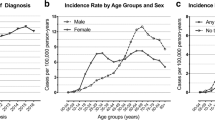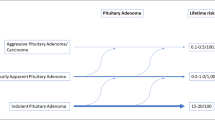Abstract
Purpose
This registry aims to collect information to create an appropriate platform for the development of a basis for clinical research and basic sciences to carefully study pituitary adenomas.
Methods
Demographic data, diagnosis, treatment, and outcome information of the patients with a confirmed diagnosis of pituitary adenomas will be collected by investigators of the registry. Analysis of registry data generates aggregate reports summarizing pituitary tumor epidemiology, treatment, and outcome. These reports include annual public data reports. In the future, the registry program may provide a wider network in Iran and ultimately support the expansion of international studies.
Conclusion
For a long time, patients with pituitary adenomas should be observed. Implementing a registration system would greatly reduce the challenges of patients’ follow-up so that their monitoring can be improved.

Similar content being viewed by others
References
Gsponer J, De Tribolet N, Déruaz JP, Janzer R, Uské A, Mirimanoff RO, et al. Diagnosis, treatment, and outcome of pituitary tumors and other abnormal intrasellar masses. Retrospective analysis of 353 patients. Medicine (Baltimore). 1999;78(4):236–69.
Saeger W, Lüdecke DK, Buchfelder M, Fahlbusch R, Quabbe HJ, Petersenn S. Pathohistological classification of pituitary tumors: 10 years of experience with the German Pituitary Tumor Registry. Eur J Endocrinol. 2007;156(2):203–16.
Snyder PJ. Gonadotroph and other clinically nonfunctioning pituitary adenomas. Cancer Treat Res. 1997;89:57–72.
Daly AF, Rixhon M, Adam C, Dempegioti A, Tichomirowa MA, Beckers A. High prevalence of pituitary adenomas: a cross-sectional study in the province of Liege. Belgium J Clin Endocrinol Metab. 2006;91(12):4769–75.
Russ S, Anastasopoulou C, Shafiq I. Pituitary Adenoma. 2023 Mar 27. In: StatPearls [Internet]. Treasure Island (FL): StatPearls Publishing; 2023.
Zielinski G, Ozdarski M, Maksymowicz M, Szamotulska K, Witek P. Prolactinomas: prognostic factors of early remission after transsphenoidal surgery. Front Endocrinol (Lausanne). 2020;7(11):439.
Fleseriu M, Biller BMK, Freda PU, Gadelha MR, Giustina A, Katznelson L, et al. A pituitary society update to acromegaly management guidelines. Pituitary. 2021;24(1):1–13.
Hinojosa-Amaya JM, Cuevas-Ramos D. The definition of remission and recurrence of Cushing’s disease. Best Pract Res Clin Endocrinol Metab. 2021;35(1):101485. https://doi.org/10.1016/j.beem.2021.101485.
Drange MR, Fram NR, Herman-Bonert V, Melmed S. Pituitary tumor registry: a novel clinical resource. J Clin Endocrinol Metab. 2000;85(1):168–74.
Berkmann S, Schütz P, Röthlisberger M, Mariani L, Kothbauer K, Fischli S, et al. The Swiss Pituitary Registry—SwissPit. J Neurol Surg A Cent Eur Neurosurg. 2018;79(S 01):O18.
Khamseh ME, Mohajeri Tehrani MR, Mousavi Z, Malek M, Imani M, Hoshangian Tehrani N, et al. Iran pituitary tumor registry: description of the program and initial results. Arch Iran Med. 2017;20(12):746–51.
Surawicz TS, McCarthy BJ, Kupelian V, Jukich PJ, Bruner JM, Davis FG. Descriptive epidemiology of primary brain and CNS tumors: results from the Central Brain Tumor Registry of the United States, 1990–1994. Neuro Oncol. 1999;1(1):14–25.
Funding
Pituitary Registry program was supported by Tehran University of Medical Sciences and Endocrinology and Metabolism Research Institute.
Author information
Authors and Affiliations
Corresponding authors
Ethics declarations
Conflict of interest
The authors declared that they have no conflict of interest.
Additional information
Publisher's Note
Springer Nature remains neutral with regard to jurisdictional claims in published maps and institutional affiliations.
Rights and permissions
Springer Nature or its licensor (e.g. a society or other partner) holds exclusive rights to this article under a publishing agreement with the author(s) or other rightsholder(s); author self-archiving of the accepted manuscript version of this article is solely governed by the terms of such publishing agreement and applicable law.
About this article
Cite this article
Mohseni, S., Asgari, AM., Saeedi, S. et al. Pituitary tumor registry: a multidisciplinary program protocol. J Diabetes Metab Disord 22, 1801–1804 (2023). https://doi.org/10.1007/s40200-023-01306-1
Received:
Accepted:
Published:
Issue Date:
DOI: https://doi.org/10.1007/s40200-023-01306-1




